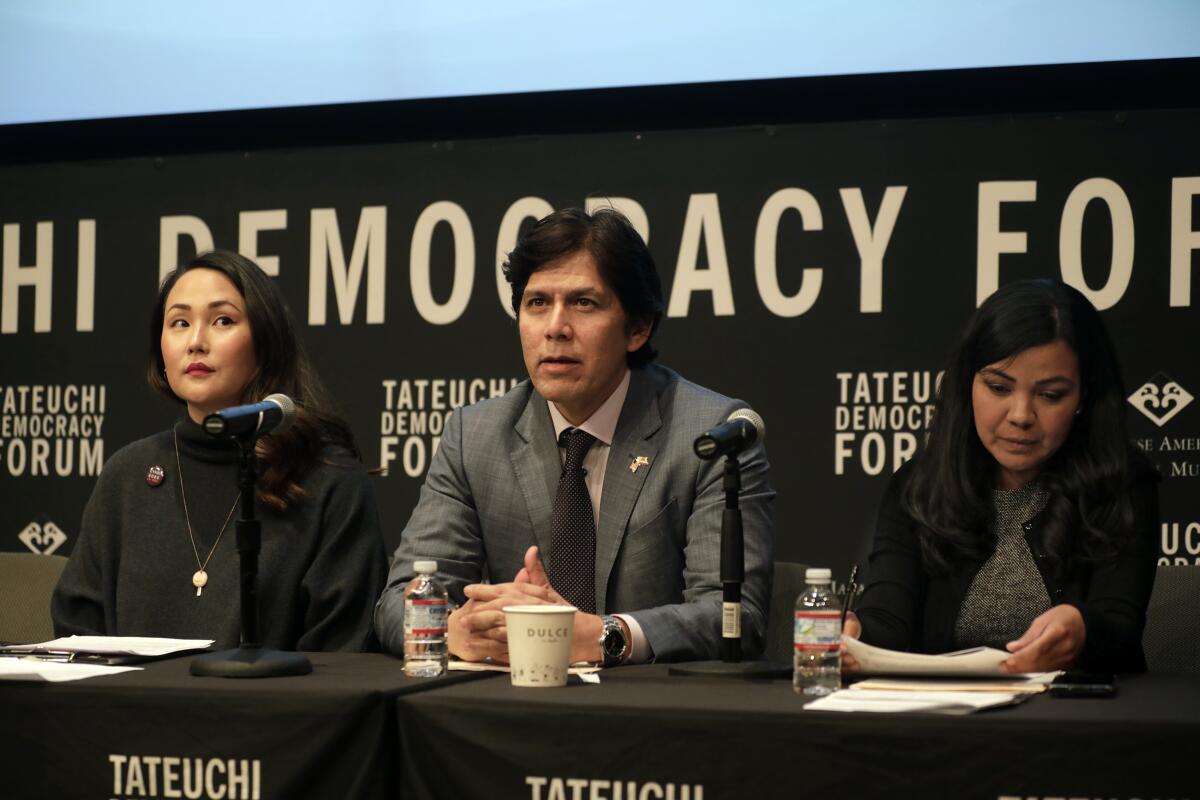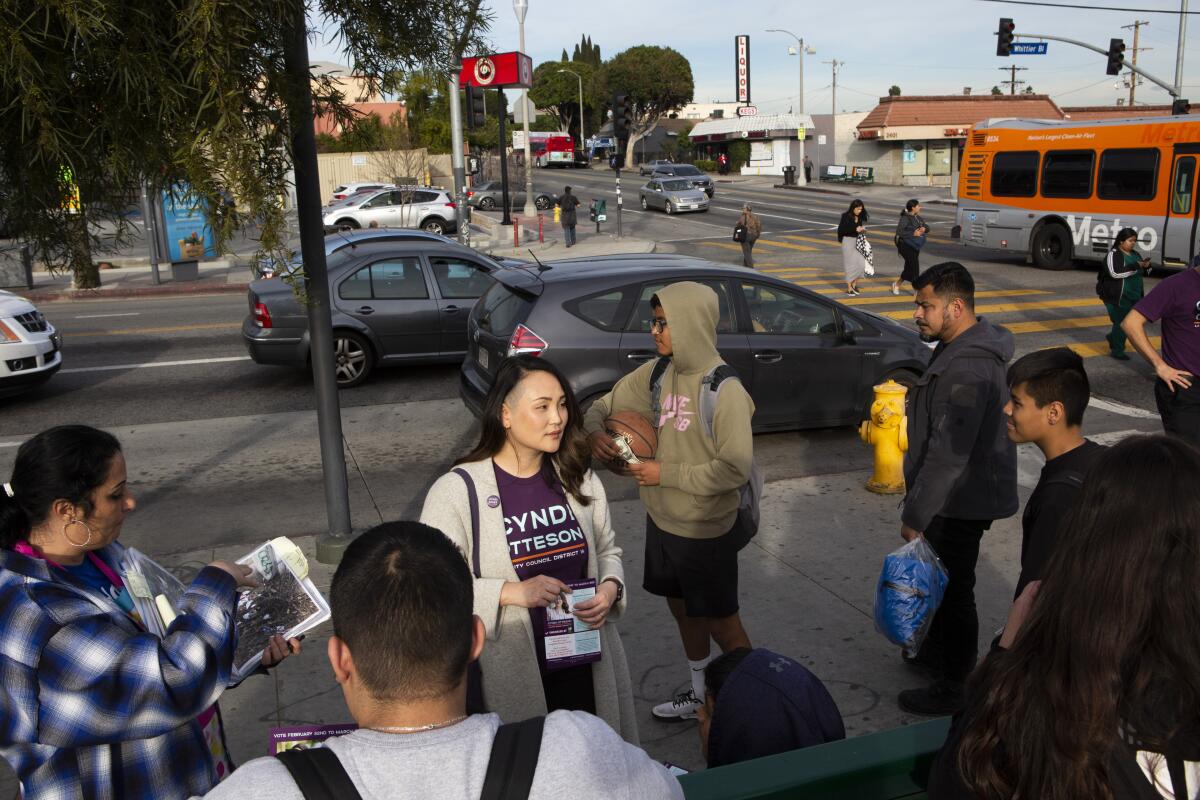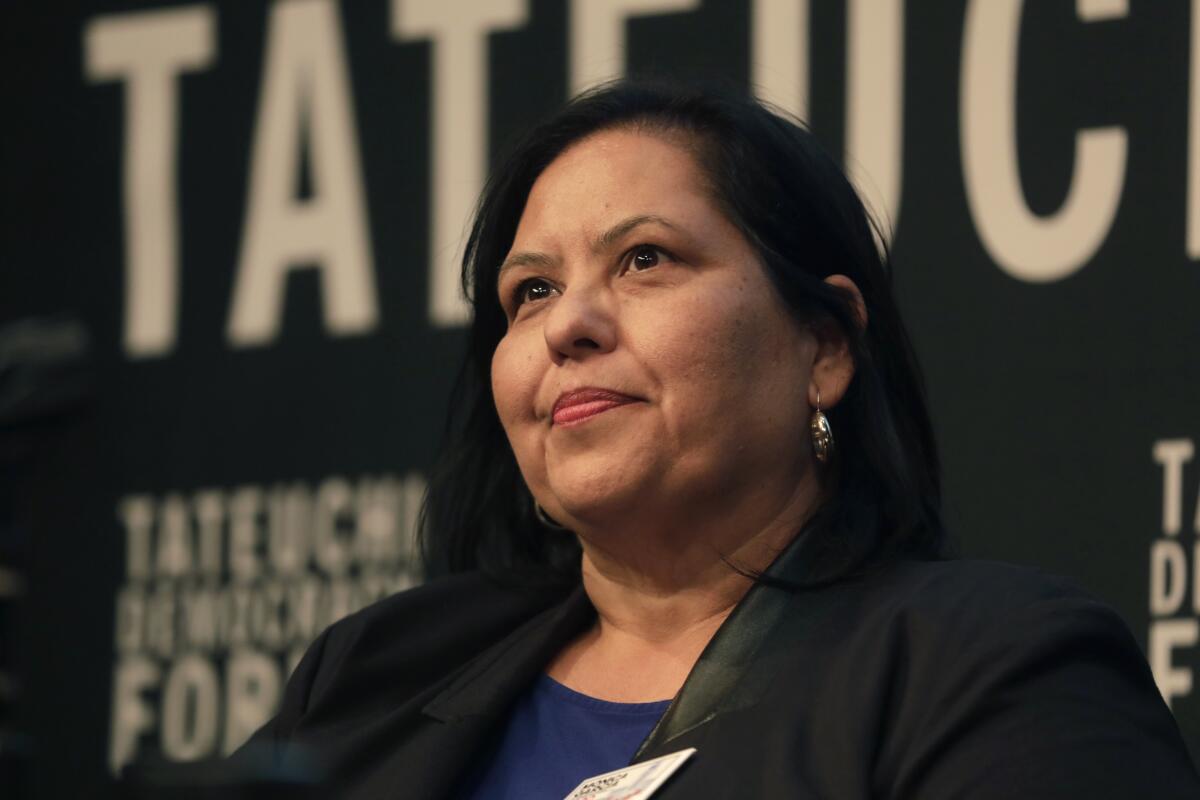In this L.A. City Council election, Kevin de León is the underdog turned big dog

- Share via
Two years ago, former California state Senate leader Kevin de León waged a longshot campaign to unseat U.S. Sen. Dianne Feinstein, a Democratic Party veteran.
That bid was unsuccessful. But this year, De León is anything but the underdog in the race to replace Los Angeles City Councilman Jose Huizar, who is stepping down because of term limits and whose office was raided by the FBI.
In his campaign to represent a district stretching from downtown to Eagle Rock, De León is supported by organized labor, the L.A. County Democratic Party and Mayor Eric Garcetti — and he has already spent more than half a million dollars on consultants, staff and other expenses.
On the stump, De León peppers his speeches with career highlights: organizing the 1994 march against Proposition 187, championing bills in the state Legislature to protect immigrants and force a transition to renewable energy, and engaging in public battles over policy with then-U.S. Atty. Gen. Jeff Sessions.
But De León’s top rivals portray him as an outsider. They argue that someone from the community should oversee the district, which has the highest number of homeless people in the city, is crisscrossed by multiple freeways and blighted by broken sidewalks and trash.
With high turnout expected for the March 3 primary election, possibly led by younger voters, the question is whether the district will go for a big-name politician in De León or a lower-profile local candidate.
Others vying for Huizar’s seat include Cyndi Otteson, a former Eagle Rock Neighborhood Council vice president; Raquel Zamora, a high school counselor; Mónica García, a school board member; and John Jimenez, the founder of an educational nonprofit — all of whom are less well known than the former Senate leader.

Canvassing in Boyle Heights on a recent afternoon, Otteson knocked on the door of a home with a De León sign and launched into a speech outlining her experience as a mother of two young children and her endorsement from the union representing Los Angeles teachers.
While De León has Sacramento experience, she told The Times later, “I have the right kind of experience, which is in local government.” Otteson, for instance, recounted how she worked on the neighborhood council to halt the installation of a controversial cellphone tower.
Otteson has proposed sweeping changes at City Hall, including moving to publicly financed elections and expanding the 15-member City Council to better represent L.A.’s 4 million residents.
At debates, Otteson sells herself by announcing that she’s not “a man or a career politician,” and she urges voters to elect the district’s first female council member.
Keith Smith, associate professor of political science at University of the Pacific, said it’s not surprising that candidates are highlighting their differences with the former state legislator. But De León’s perceived advantages also may mean little to voters.
“It’s a weird moment to be an insider candidate, especially within the Democratic Party,” Smith said. “There’s a sense that it’s better to be perceived as an outsider.”
At a packed campaign event at a Mexican restaurant in El Sereno last month, De León strode from table to table, embracing longtime friends and supporters. As attendees lined up for free tacos, Hugo Garcia, president of a local environmental justice organization, introduced him as a politician who stood with the community to fight the development of a multimillion-dollar gated community in El Sereno.
“You know who I am, you know my record,” De León told the crowd. “It’s been controversial for many folks, but that’s OK. Because the decisions that I make are driven by my values.”
A Los Angeles native, De León served in the Legislature — first in the Assembly, then in the Senate, where he was president pro tem — from 2006 until 2018, representing neighborhoods in the council district.
In an interview, he shrugged off the attacks against him, but said “experience matters” and that he wouldn’t be “shamed” for his years spent in office. He pointed to his endorsement from the Heart of L.A. Democratic Club, which supports candidates who are feminists, as an example of the diversity of his base of support.
The election has divided some families. Hillside Village resident Ray Rios, who serves as president of the local homeowners association, planted two signs supporting De León on the family lawn. His wife, Ruth, planted a sign for Zamora, however.
Ray Rios said De León’s political experience will make it easier for him to navigate City Hall. “I think we can work with him more effectively,” he said. But Ruth, he said, wants a “fresh person from the community.”
Zamora, who helps run a family restaurant in Boyle Heights, has criticized De León for refusing to sign a pledge promising that he would serve a full term if elected. Some voters bitterly recall when Antonio Villaraigosa — then a former state Assembly member— ran for the same City Council seat in 2002 and said he would serve a full four years. But he broke that promise, running for mayor and winning.
At a debate earlier this month in Eagle Rock, Zamora said she was tired of the seat “being used and abused.” There has been “corruption,” she said, and it has been “a springboard for other elected officials and it has to stop.”
In 2018, the FBI raided Huizar’s City Hall office and home, but no arrests have been made and no charges have been filed. With Huizar unable to seek reelection, the incident hasn’t become a dominant issue in the race. Instead, homelessness is the major topic.
Jimenez, who hasn’t reported raising any money for his campaign, says he wants to investigate the city-county agency that coordinates homeless services.
Otteson has proposed a more “humane” approach to conducting city clean-ups of homeless encampments — one that doesn’t punish those who live there. She also wants to create drop-in centers for homeless people.
Zamora, who shares a joint endorsement with Otteson from the teachers union and served on a city commission focused on poverty, wants to use school parking lots for “safe parking” programs and allow homeless students to shower at school.
De León often reminds voters that he worked to secure billions of dollars for homeless housing as a state legislator — money that’s now flowing to cities. He wants to cut housing costs by using prefabricated materials and has proposed having the city manage rental properties to reduce evictions.

García is pitching an emergency grant program to help Angelenos cover their rent and another citywide bond to pay for the construction of new housing.
She also has vowed to add more police officers to the district, if elected, and boost city funding for parks and libraries.
On the school board for 14 years, García is the longest serving current member. During her tenure, she has seen graduation rates rise, but also disappointing levels of achievement among students. She is typically opposed by the teachers union and backed by supporters of charter schools and the largest union representing nonteaching employees, but that support hasn’t translated into outside spending for her council campaign.
Labor organizations have been sending out mailers and calling residents to tell them to vote for De León. García’s campaign, meanwhile, has been targeting his political record with a series of online videos casting him as a “disappointment.”
“Certainly the establishment and the elite have chosen who they are with,” García said, alluding to De León. “But the question remains: Who inspires people to vote?”
More to Read
Sign up for Essential California
The most important California stories and recommendations in your inbox every morning.
You may occasionally receive promotional content from the Los Angeles Times.











